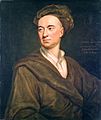1667 facts for kids
| Millennium: | 2nd millennium |
|---|---|
| Centuries: | 16th century – 17th century – 18th century |
| Decades: | 1630s 1640s 1650s – 1660s – 1670s 1680s 1690s |
| Years: | 1664 1665 1666 – 1667 – 1668 1669 1670 |
The year 1667 was a time of important changes and events around the world. Countries made peace treaties, new ideas in science emerged, and famous books were published. Let's explore some of the key moments from this year.
Contents
Major World Events
Peace Treaties and Power Shifts
- January 20: A big agreement called the Treaty of Andrusovo was signed. This treaty ended a long period of wars known as the Deluge. In this treaty, Poland gave up important lands like Kyiv, Smolensk, and parts of eastern Ukraine to Russia. This made Poland less powerful in Central Europe.
- July 31: The Second Anglo-Dutch War finally ended with the signing of the Treaty of Breda. This treaty helped bring peace between England and the Netherlands. It also officially recognized Acadia (a region in North America) as belonging to France.
Important Discoveries and Innovations
- June 15: A French doctor named Jean-Baptiste Denys performed the first recorded human blood transfusion. He transferred blood from a sheep into a 15-year-old boy. This was a very risky procedure at the time, and while this first one was successful, later attempts led to problems.
- Scientific Breakthroughs: The famous scientist Robert Hooke showed that changes happening to blood in the lungs are very important for how we breathe. This was a big step in understanding how our bodies work.
Conflicts and Military Changes
- June 12-17: During the Second Anglo-Dutch War, a Dutch fleet led by Admiral Michiel de Ruyter launched a surprise attack called the Raid on the Medway. They burned ships and dockyards in England, even taking the royal ship The Royal Charles. This was a major victory for the Dutch.
- The War of Devolution Begins: France started a new conflict called the War of Devolution. French armies invaded Flanders and Free County, which were territories belonging to Spain.
- New Soldiers: The French army began using a new type of soldier called grenadiers. These soldiers were known for throwing small bombs called grenades.
Changes in Leadership and Governance
- October 18: The area we now know as Brooklyn in New York was officially given its charter (a special document that sets up a town or city). It was first called Brueckelen by Mathias Nicolls, who was the Governor of New Netherland.
- Leadership in France: Louis XIV of France made some important changes. He got rid of an old type of money called the Livre Parisis and made the Livre Tournois the main currency. He also appointed Gabriel-Nicolas de la Reynie as the first chief of police for Paris, helping to keep the city safe.
- New Emperor in Ethiopia: Yohannes became the new Emperor of Ethiopia, taking over from his father, Fasildos.
- Persian Leadership: Suleiman I became the new Shah (ruler) of Persia.
- Mogul Empire: The Mogul Emperor Aurangzeb made a deal with a bandit leader named Shivaji. Aurangzeb made Shivaji a Rajah (a type of prince or ruler) and allowed him to collect taxes, which helped to reduce conflict.
Notable People and Literature
- April 27: The famous English writer John Milton, who was blind and not very wealthy, sold the rights to his epic poem Paradise Lost for just £10. This poem is still considered one of the greatest works in English literature.
Births
- August 11: Anna Maria Luisa de' Medici, a Tuscan princess, was born.
- November 30: Jonathan Swift, a famous Irish writer, was born. He is well-known for books like Gulliver's Travels.
Images for kids
-
May 24: The War of Devolution begins.
See also
 In Spanish: 1667 para niños
In Spanish: 1667 para niños

All content from Kiddle encyclopedia articles (including the article images and facts) can be freely used under Attribution-ShareAlike license, unless stated otherwise. Cite this article:
1667 Facts for Kids. Kiddle Encyclopedia.





